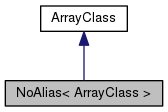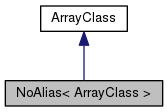|
GNU Octave
4.0.0
A high-level interpreted language, primarily intended for numerical computations, mostly compatible with Matlab
|
|
GNU Octave
4.0.0
A high-level interpreted language, primarily intended for numerical computations, mostly compatible with Matlab
|
This is a simple wrapper template that will subclass an Array<T> type or any later type derived from it and override the default non-const operator() to not check for the array's uniqueness. More...
#include "Array.h"


Public Member Functions | |
| NoAlias () | |
| template<class X > | |
| NoAlias (X x) | |
| template<class X , class Y > | |
| NoAlias (X x, Y y) | |
| template<class X , class Y , class Z > | |
| NoAlias (X x, Y y, Z z) | |
| T & | operator() (octave_idx_type n) |
| T & | operator() (octave_idx_type i, octave_idx_type j) |
| T & | operator() (octave_idx_type i, octave_idx_type j, octave_idx_type k) |
| T & | operator() (const Array< octave_idx_type > &ra_idx) |
Private Types | |
| typedef ArrayClass::element_type | T |
This is a simple wrapper template that will subclass an Array<T> type or any later type derived from it and override the default non-const operator() to not check for the array's uniqueness.
It is, however, the user's responsibility to ensure the array is actually unaliased whenever elements are accessed.
|
private |
|
inline |
|
inlineexplicit |
|
inlineexplicit |
|
inline |
|
inline |
|
inline |
|
inline |
 1.8.8
1.8.8